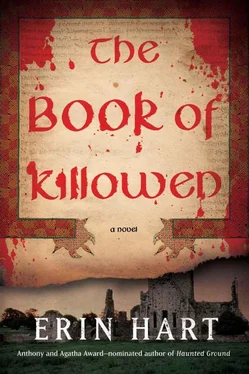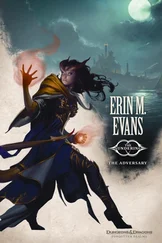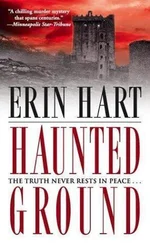
BOOK TWO

Truagh sin, a leabhair bhig bháin,
tiocfaidh an lá, is budh fíor,
déarfaidh neach os cionn do chláir:
“Ní mhaireann an lámh do sgríobh.”
This is sad! O little white book!
A day will come in truth,
when someone over your page will say,
“The hand that wrote it is no more.”
—Verse written by an Irish scribe in the margin of a medieval manuscript
The kitchen at Killowen was filled with morning light. Cormac found his father sitting at the table, and Eliana nowhere to be seen.
“Have you had your breakfast?” he asked, then noticed a scattering of crumbs on the table before them, an answer to his question. “Where’s Eliana?”
Joseph’s eyes flickered to the window. “Ticka boffing majuscule.” He shielded his face from the figures in the garden, where Cormac could see Eliana talking to Claire Finnerty.
“What is it? Something about Eliana?” Cormac was conscious of the girl’s dark head glinting in the bright sunlight outside.
Joseph seized his hand. “She’s the porpoise—no, no, these are bad wugs.”
“Is something wrong? Are you not happy with Eliana?”
The old man’s lips worked, hands fluttering in vague gestures above the table’s surface.
He’d been making progress over the past three or four months, even incorporating a bit of sign language into his speech therapy sessions. Most of the signs concerned everyday occupations—eating, getting dressed, all the tasks that came with trying to relearn the words for items a person might use in any ordinary day. They hadn’t progressed to the more difficult concepts.
Cormac remembered glancing into his rearview mirror yesterday, seeing his father’s eyes locked on Eliana. Was he ill at ease with this new caretaker? Cormac had tried making a study of his father’s various facial expressions over the past twelve months, but this latest agitation was something new, like nothing else he’d seen. So many possible shades of meaning in the touch of his hand—fear, urgency, panic.
“I’m sorry. I don’t understand.” He watched the old man’s face crumple in frustration, feeling helpless and dull-witted, bereft of words himself. Words were a false currency in expressive aphasia, a translation machine gone seriously haywire.
Out in the garden, Claire Finnerty turned and led Eliana back into the kitchen. Joseph dropped Cormac’s hand and stared at the tabletop, unable—or unwilling—to make eye contact with any of them.
“Look what Claire has brought for our lunch today,” Eliana said. “I like the name I read in a book once—‘string beans.’ That’s quite funny, isn’t it?” She held up a perfect specimen in front of Joseph’s face. “Perhaps you would help me.” She gestured, showing how she was going to snap their tender necks.
Joseph didn’t look up; he made a noise halfway between grunt and sigh. Eliana looked at Cormac. “Have I said something wrong?”
Cormac shook his head. “No, Eliana, I’m sure he’d be glad to help.” Seeing the expression on his father’s face, like a man being led to the gallows, Cormac crouched beside him and spoke quietly: “I’ve got to go now—we’ll talk later, all right?” He took his father’s hand again, offered a reassuring squeeze. The old man pulled his hand away and stared out the window.
Cormac headed out to wait for Niall Dawson, wondering if he was missing something important because he was distracted by this work out at the bog. How ironic that he should be the one feeling guilty, this late in the game, when it was his father who had been missing for so much of his life.
While he waited, he rang Nora, who was on her way to the hospital in Birr.
“Everything all right?” she asked.
“I’m not sure. My father was trying to tell me something. Something about ticks, or porpoises. He didn’t want me to leave.” Cormac hesitated. “I suppose whatever it is, we can sort it out this afternoon. Eliana seemed in great spirits, by the way.” He remembered the gentle playfulness in the girl’s face as she offered his father the beans. “Whatever upset her last night seems to have passed.”
“I’ll be back from the hospital after the exam, so I’ll try talking to Joseph.”
He was silent for a brief second. “You’re so good with him, Nora—”
She cut him off. “Ah, now, remember our agreement.”
Early on in their odd household arrangement, they had agreed that there would be no silliness about things like indebtedness between them. They were all just doing what was necessary, what had to be done. And it was as if she had understood quite clearly from the beginning that she would be a kind of buffer between father and son, taking the role that Cormac’s mother had once filled, if only briefly. Whenever he closed his eyes, he saw the three of them—himself, Nora, and his father—holding hands in a line, like a group of children striking out into uncharted territory. The stroke had picked them up and landed them in a place where nothing was familiar, but Cormac knew it was the only place he wanted to live.
Stella rose before dawn on Friday and took the M7 into Dublin, enjoying the smooth comfort of the motorway but quite missing the drive through the winding old coach roads, the sight of the pubs where her father invariably stopped for refreshment on the way in and out of the city, following his true religion—sport, and championship hurling in particular. But time was money these days, and the gleaming white concrete motorways were a sign of the new religion.
She’d decided late last night to make this trip herself and not leave it to anyone else. This was her investigation, and Serious Crimes could get seriously stuffed if they hadn’t made it over to interview the victim’s spouse by now.
It was just gone half-eight when she pulled up in front of Benedict Kavanagh’s house in the city center. The Kavanagh/Broome residence was one of those Georgian monstrosities on North Great George’s Street. Artists and other creative types had snapped up these grand but crumbling houses for next to nothing back in the eighties, living with scaffolding for years until development made the street fashionable again. Stella stood before the door, painted a brilliant aquamarine under the fanlight, and rapped twice with the huge brass knocker shaped like a fist. Had to be a story behind that. There was a story behind most things, if you were paying attention.
When the door swung open, it revealed a barefoot and stylishly stubbly young gent in black jeans and an expensive cashmere jumper. “We’re not open.” He pointed to a brass plaque beside the door: TUESDAYS AND THURSDAYS ONLY, BY APPOINTMENT.
“That’s all right,” Stella said, producing her ID. “I’m not here about art.”
The young man’s eyes narrowed as he comprehended the nature of her visit. He ushered her into the foyer, and she saw that the whole ground floor was done up as a gallery, with large paintings that nearly covered the walls. The cracked plaster behind them was real, impressions of centuries behind wallpaper, a fresco of evidence to a trained eye. Here and there a chair or a table with a vase of flowers that beautifully set off the paintings. What was it like to have such an eye? Stella wondered, thinking of her own drab sitting room with its insipid wallpaper and matching suite.
Читать дальше













